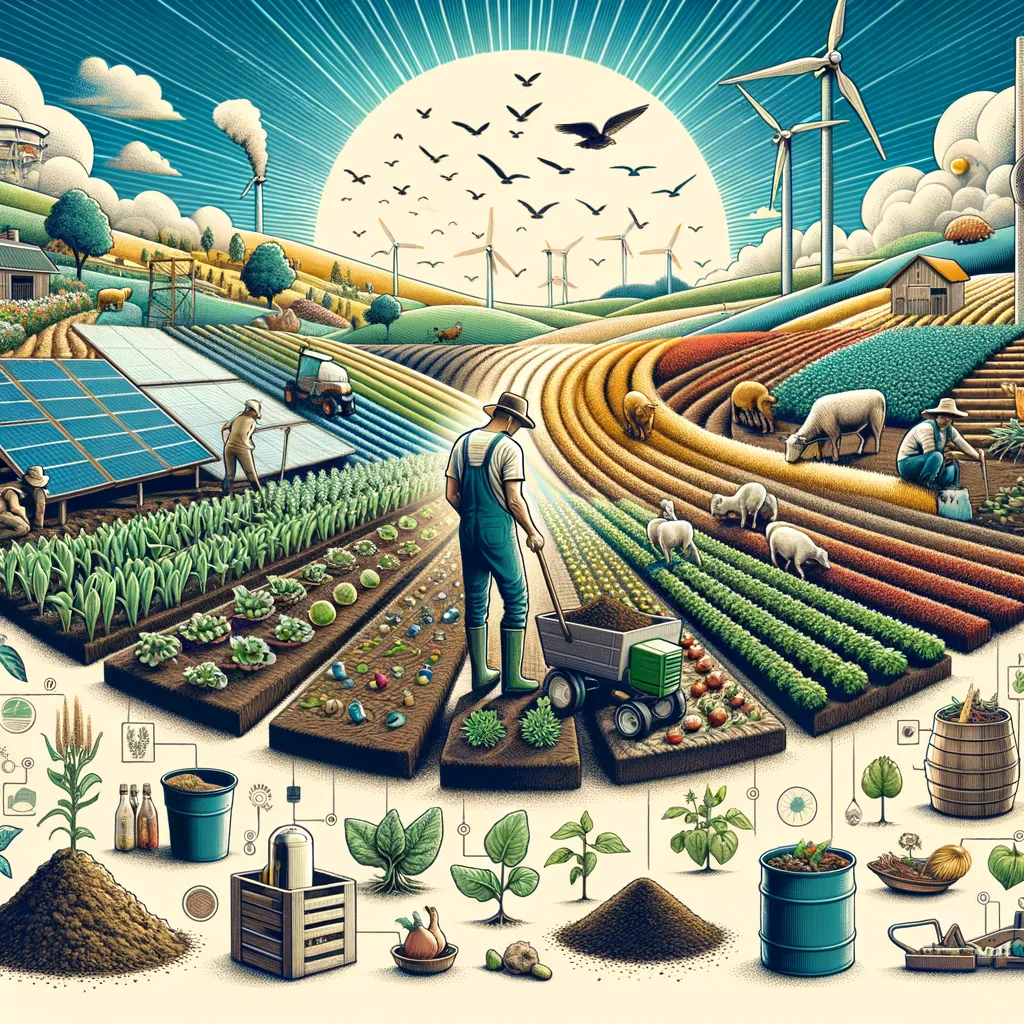Embracing the Past for a Greener Future: Traditional Farming and Sustainable Agriculture
As guardians of the next generation, parents have a unique opportunity to foster an appreciation for the earth and its resources. One compelling way to inspire eco-consciousness in our families is by learning from the past. Traditional farming practices, honed over centuries, offer a treasure trove of wisdom on living in harmony with nature. This guide delves into how these age-old methods can inform and reshape modern sustainable agriculture, creating a brighter, healthier future for our children.
For those seeking inspiration on connecting with nature and learning more about sustainable living, Outdoors provides a wealth of information. Meanwhile, to delve deeper into the heart of reconnecting with nature through activities, don’t miss the essential insights available at Camping Information.
Understanding Traditional Farming
Before industrial agriculture revolutionized how we grow our food, farmers relied on a variety of practices that had minimal environmental impact. These methods were inherently sustainable, aimed at preserving the fertility of the soil, conserving water, and promoting biodiversity. From crop rotation and intercropping to the use of organic matter for fertilization, traditional farming practices offer lessons in how to reduce our carbon footprint and promote ecological balance.
The Power of Crop Rotation
Crop rotation is a practice as old as agriculture itself, where different crops are planted in succession in the same area to improve soil health and reduce pest populations. This technique not only prevents the depletion of specific nutrients in the soil but also discourages the proliferation of pests and diseases, reducing the need for chemical interventions.
Intercropping: Nature’s Pest Management
Another lesson from the past is intercropping—the planting of different crops in close proximity. This method encourages biodiversity, which is crucial for a balanced ecosystem. It naturally repels pests and attracts beneficial insects, reducing the need for harmful pesticides and promoting healthier crops.
Nature’s Fertilizers
Long before the advent of chemical fertilizers, farmers used organic matter to nourish their soil. Composting, the process of recycling organic waste into rich soil, was common. This practice not only reduces waste but also enriches the soil, promoting healthier plant growth without the use of synthetic substances.
Water Conservation Techniques
Traditional agriculture also offers wisdom in the art of water conservation. Techniques such as rainwater harvesting, terracing, and the construction of small-scale irrigation channels helped manage water efficiently, ensuring crops received necessary hydration without the wastage prevalent in some modern farming practices.
As we look to sustainable solutions for current agricultural challenges, these traditional practices shine a light on the path forward. By integrating age-old wisdom with modern technology, we can create a sustainable agriculture system that supports the health of the planet and its inhabitants. Inviting your children to learn about and participate in these practices can instill in them a deep respect for nature and the importance of sustainability.
Embrace the Past for a Sustainable Future: Traditional Farming Meets Modern Agriculture
As stewards of the earth and mentors to the next generation, parents possess a pivotal role in instilling respect for nature and the principles of sustainability in our children. This comprehensive guide explores how traditional farming practices, perfected over millennia, can be the cornerstone for contemporary sustainable agriculture. By revisiting these tried and tested methods, we can educate our families on the importance of environmental stewardship and ensure a thriving planet for future generations.
Discovering the balance between modern needs and sustainable practices is crucial for our environment. Websites such as Outdoors and Camping Information serve as valuable resources for those interested in embracing nature and integrating sustainable living into their lifestyle.
Delving into Traditional Farming Techniques
Long before the rise of industrial agriculture, farmers developed techniques that were in sync with nature. These sustainable practices, such as crop rotation, intercropping, organic fertilization, and water conservation, were designed to maintain the ecological balance, ensuring the soil’s health and fertility, conserving water, and enhancing biodiversity. By understanding and implementing these methods, modern agriculture can reduce its environmental footprint and support a more sustainable future.
The Essence of Crop Rotation
An ancient practice that promotes soil health and nutrient balance, crop rotation involves alternating the types of crops grown in a particular area across seasons or years. This practice curtails the depletion of soil nutrients, mitigates pest outbreaks, and decreases the likelihood of plant diseases, thereby lowering the dependency on chemical pesticides and fertilizers.
Intercropping: Harmony in Diversity
Intercropping, the cultivation of different crops in close proximity, enriches biodiversity. This method is advantageous for pest control, pollination, and space optimization, creating a robust agricultural ecosystem. By fostering a natural balance, intercropping diminishes the need for chemical pest deterrents and encourages the growth of healthy crops.
Organic Matter as Nature’s Fertilizer
Historically, farmers relied on organic material to nourish their soils. Practices such as composting organic waste transform it into rich soil that enhances plant growth without the need for synthetic fertilizers. This natural recycling process not only bolsters soil fertility but also contributes to a decrease in agricultural waste.
Securing Water through Traditional Wisdom
Efficient water management is paramount in traditional farming, with techniques like rainwater harvesting, terracing, and the development of small irrigation systems ensuring that crops receive adequate hydration. These practices highlight the potential for modern agriculture to adopt efficient water usage strategies, mitigating the excessive consumption typical of some contemporary farming methods.
Integrating these traditional approaches with current technological advancements paves the way for sustainable agriculture that respects our planet’s limits while feeding its inhabitants. Encouraging your children to engage with and understand these practices can foster a lifelong appreciation for sustainability and the role it plays in our lives.
Five Things Parents Should Know in Preparing for Sustainable Agriculture Inspired by Traditional Farming
1. Educational Opportunities: Numerous resources are available to educate both parents and children on sustainable agriculture. Websites, documentaries, and books offer a plethora of information on traditional farming techniques and how they are applicable today.
2. Hands-On Experience: Participating in community gardens, visiting local farms, or even starting a small garden at home can provide practical experience with sustainable farming practices. Such activities not only bring families closer to nature but also teach valuable lessons in self-sufficiency and environmental responsibility.
3. Community Engagement: Involvement in local food co-ops or sustainability initiatives can offer insights into contemporary applications of traditional farming practices. These engagements serve as platforms for learning, sharing, and contributing to a more sustainable future.
4. Understanding Seasonality: Grasping the concept of seasonal eating ties back to traditional farming practices and fosters a deeper connection with the earth’s natural cycles. It encourages the consumption of fresh, locally sourced foods, reducing the carbon footprint associated with food transportation.
5. Advocacy for Sustainable Practices: Parents can play a crucial role in advocating for sustainable agricultural practices within their communities and beyond. By supporting policies that promote environmental stewardship and sustainable farming, families contribute to a larger movement toward eco-friendly living.
By intertwining the wisdom of traditional farming
Disclaimer
The articles available via our website provide general information only and we strongly urge readers to exercise caution and conduct their own thorough research and fact-checking. The information presented should not be taken as absolute truth, and, to the maximum extent permitted by law, we will not be held liable for any inaccuracies or errors in the content. It is essential for individuals to independently verify and validate the information before making any decisions or taking any actions based on the articles.





